| Listing 1 - 10 of 20 | << page >> |
Sort by
|
Book
ISBN: 2873740531 9782873740535 Year: 2000 Publisher: Namur: Artel,
Abstract | Keywords | Export | Availability | Bookmark
 Loading...
Loading...Choose an application
- Reference Manager
- EndNote
- RefWorks (Direct export to RefWorks)
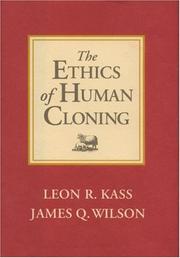
Abstract | Keywords | Export | Availability | Bookmark
 Loading...
Loading...Choose an application
- Reference Manager
- EndNote
- RefWorks (Direct export to RefWorks)
Explores the ethics of human cloning, reproductive technology and the teleology of sexuality from two perspectives which both fundamentally distrust the notion of cloning, but for differing reasons. The volume is intended to inform the public policy debate on permissible genetic research. Today, biological science is rising on a wall of worry. No other science has advanced more dramatically during the past several decades, nor yielded so many palpable improvements in human welfare. Yet none except nuclear physics has aroused greater apprehensions among the general public and leaders in such diverse fields as religion, the humanities and government. In this volume, Leon R. Kass, a teacher, scientist and humanist, and James Q. Wilson, a political scientist to whom four US presidents have turned for advice on crime, drug abuse, education and other crises in American life, explore the ethics of human cloning, reproductive technology and the teleology of human sexuality. Although in their dialogue, both authors share a fundamental distrust of the notion of human cloning, they base their reticence on different views of the role of sexual reproduction and the role of the family. Professor Kass contends that in vitro fertilization and other assisted reproduction techniques that place the origin of human life in human hands have eroded the respect for the mystery of sexuality and human renewal. Professor Wilson, in contrast, asserts that whether a human life is created naturally or artificially is immaterial as long as the child is raised by loving parents in a two-parent family and is not harmed by the means of its conception. The volume is intended to inform the public policy debate over the permissible conduct of genetic research and the permissible uses of its discoveries.
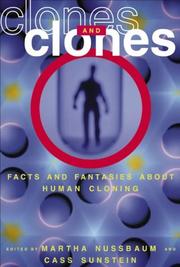
ISBN: 0393046486 Year: 1998 Publisher: New York (N.Y.) : Norton,
Abstract | Keywords | Export | Availability | Bookmark
 Loading...
Loading...Choose an application
- Reference Manager
- EndNote
- RefWorks (Direct export to RefWorks)
Ranging from psychoanalyst Adam Phillips's case study of a child whose confusion of "cloning" and "clothing" expresses our mixed desire and terror of sameness, to Cass Sunstein's projections of utterly plausible Supreme Court decisions both for and against human cloning; from William Miller's analysis of the queasiness and nervous laughter the subject elicits in many of us to Richard Epstein's libertarian argument against a research ban; from Andrea Dworkin's denunciation of another masculine effort to control reproduction to Martha Nussbaum's witty and elegiac fantasy of the cloning of a lost lover - this collection limns our beliefs and concerns about what it means to be human.
Professional ethics. Deontology --- Human cloning --- Moral and ethical aspects. --- Social aspects. --- kloneren (klonen, therapeutisch kloneren, reproductief kloneren) --- clonage (clonage thérapeutique, clonage reproductif) --- Human beings --- Cloning --- Human reproductive technology --- Moral and ethical aspects --- Social aspects
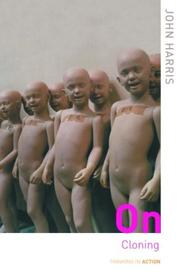
ISBN: 0415316995 0415317002 Year: 2004 Publisher: London Routledge
Abstract | Keywords | Export | Availability | Bookmark
 Loading...
Loading...Choose an application
- Reference Manager
- EndNote
- RefWorks (Direct export to RefWorks)
Cloning - few words have as much potential to grip our imagination or grab the headlines. No longer the stuff of science fiction or Star Wars - it is happening now. Yet human cloning is currently banned throughout the world, and therapeutic cloning banned in many countries. In this highly controversial book, John Harris does a lot more than ask why we are so afraid of cloning. He presents a deft and informed defence of human cloning, carefully exposing the rhetorical and highly dubious arguments against it. He begins with an introduction to what a human clone is, before tackling some of the most common and frequently bizarre criticisms of cloning: Is it really wicked? Can we regulate it? What about the welfare of cloned children? Does it turn human beings into commodities? Dismissing one by one some of the myths about human cloning, in particular that it is degrading and unsafe, he astutely argues that some of our most cherished values, such as the freedom to start a family and the freedom from state control, actually support the case for human cloning. Offering a brave and lucid insight into this ethical minefield, John Harris at last shows that far from ending the diversity of human life or creating a race of super-clones, cloning has the power to improve and heal human life. In this gripping and controversial book, John Harris presents a deft and informed defence of human cloning. Offering a brave and lucid insight into this ethical minefield, John Harris at last shows that far from spelling the end of human life [...]
Professional ethics. Deontology --- kloneren (klonen, therapeutisch kloneren, reproductief kloneren) --- clonage (clonage thérapeutique, clonage reproductif) --- Human cloning --- Human cloning. --- Moral and ethical aspects. --- Human beings --- Cloning --- Human reproductive technology --- Moral and ethical aspects
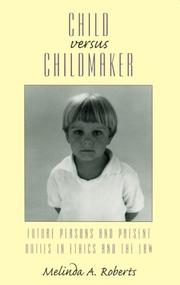
ISBN: 0847689018 084768900X Year: 1998 Publisher: Lanham Rowman & Littlefield
Abstract | Keywords | Export | Availability | Bookmark
 Loading...
Loading...Choose an application
- Reference Manager
- EndNote
- RefWorks (Direct export to RefWorks)
Child Versus Childmaker investigates a "person-affecting" approach to ethical choice. A form of consequentialism, this approach is intended to capture the idea that agents ought both do the most good that they can and respect each person as distinct from each other. Focusing on cases in which a conflict of interest arises between "childmakers"-parents, infertility specialists, embryologists, and others engaged in the task of bringing new people into existence-and the children they aim to create, the author considers what we today owe those who will come into existence tomorrow. Topics addressed include: what the person-affecting intuition is and how it differs from other forms of consequentialism; the consistency of the person-affecting intuition; the non-identity problem; wrongful life; and human cloning and other new reproductive technologies. This book is intended for upper-level undergraduates and graduate students in philosophy, law and economics and for anyone interested in bioethics, population policy, normative theory, children's rights, constitutional privacy, or family law.
Cloning --- Human reproductive technology --- Moral and ethical aspects. --- waarde van het leven (wrongful life) --- kloneren (klonen, therapeutisch kloneren, reproductief kloneren) --- voortplanting (reproductie) --- ethiek (ethische aspecten) --- valeur de la vie (vie préjudiciable, naissance préjudiciable) --- clonage (clonage thérapeutique, clonage reproductif) --- procréation (reproduction) --- ethique (aspects ethiques) --- Genetic engineering --- Reproduction, Asexual --- Moral and ethical aspects
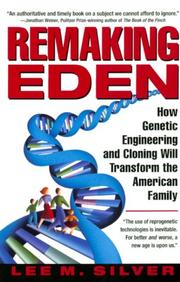
ISBN: 0380792435 Year: 2002 Publisher: New York, N.Y. Perennial
Abstract | Keywords | Export | Availability | Bookmark
 Loading...
Loading...Choose an application
- Reference Manager
- EndNote
- RefWorks (Direct export to RefWorks)
reproductieve technologie (voortplantingstechnologie, medisch begeleide voortplanting, MBV, artificiële voortplanting, kunstmatige voortplanting) --- kloneren (klonen, therapeutisch kloneren, reproductief kloneren) --- technique de reproduction (technique de procréation, procréation médicalement assistée, PMA, procréation artificielle) --- clonage (clonage thérapeutique, clonage reproductif) --- Professional ethics. Deontology --- Sociology of the family. Sociology of sexuality --- Human genetics
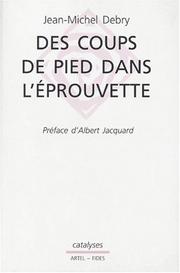
ISBN: 2873740345 2762119502 9782873740344 Year: 1997 Volume: *30 Publisher: Namur: Artel,
Abstract | Keywords | Export | Availability | Bookmark
 Loading...
Loading...Choose an application
- Reference Manager
- EndNote
- RefWorks (Direct export to RefWorks)
Du clonage à l'insémination assistée, du diagnostic pré-implantatoire à la recherche embryonnaire, l'auteur, biologiste, tente à la lumière de réalités scientifiques très circonstanciées qu'il connaît bien, de rétablir une logique qui est forcément aussi la sienne.
Ethique philosophique --- Geneeskunde --- Médecine --- Recherche scientifique --- Wetenschappelijk onderzoek --- Wijsgerige ethiek --- #GBIB:CBMER --- kloneren (klonen, therapeutisch kloneren, reproductief kloneren) --- pre-implantatie genetische diagnose (PGD) --- sekseselectie (geslachtsselectie) --- vruchtbaarheid (fertiliteit, onvruchtbaarheid, steriliteit) --- intracytoplasmische spermainjectie --- reproductieve technologie (voortplantingstechnologie, medisch begeleide voortplanting, MBV, artificiële voortplanting, kunstmatige voortplanting) --- clonage (clonage thérapeutique, clonage reproductif) --- diagnostique génétique pré-implantatoire (DPI, diagnostic préimplantatoire) --- sélection de sexe (choix du sexe) --- fertilité (infertilité, sterilité) --- injection intra cytoplasmique de sperme --- technique de reproduction (technique de procréation, procréation médicalement assistée, PMA, procréation artificielle)
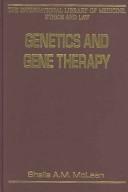
ISBN: 0754620557 Year: 2005 Publisher: Aldershot Ashgate/Dartmouth
Abstract | Keywords | Export | Availability | Bookmark
 Loading...
Loading...Choose an application
- Reference Manager
- EndNote
- RefWorks (Direct export to RefWorks)
Genetics and Gene Therapy shows the wide range of the debate and the very real significance that genetics and its associated developments have for human beings, individually and collectively. Few areas of science and medicine have resulted in the volume of academic and popular literature as has genetics. The so-called revolution in understanding of the causes of disease states, and even behavioural traits, has focussed public attention on the influence of genes in making us what we are. Rapidly, however, the potential benefits of such understanding were overtaken, in the public mind at least, by the question of the possible (negative) implications of genetic knowledge and associated technologies. The chapters in this volume show just how wide-ranging concern has become, ranging from regulation to cloning, with the fear of discrimination in between. Part One begins with a range of general discussions of about the genetic enterprise itself, followed by consideration of some specific questions. Part Two then addresses cutting edge debates in genetics.
genetica (genen) --- gentherapie --- predictieve genetische test (voorspellende genetische test) --- stamcellen --- pre-implantatie genetische diagnose (PGD) --- kloneren (klonen, therapeutisch kloneren, reproductief kloneren) --- genetische discriminatie --- menselijk genoom --- persoonlijke levenssfeer (privacy, bescherming van de persoonlijke levenssfeer, anonimiteit) --- farmacogenetica --- génétique (gènes) --- thérapie génique --- test génétique prédictif --- cellules souches --- diagnostique génétique pré-implantatoire (DPI, diagnostic préimplantatoire) --- clonage (clonage thérapeutique, clonage reproductif) --- discrimination génétique --- génome humain --- vie privée (protection de la vie privée, anonymat) --- pharmacogénétique --- Gene therapy --- Medical genetics --- Therapy, Gene --- Genetic engineering --- Therapeutics --- Moral and ethical aspects
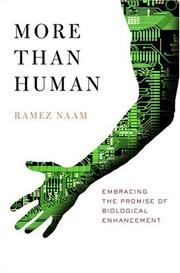
ISBN: 0767918436 Year: 2005 Publisher: New York Broadway books
Abstract | Keywords | Export | Availability | Bookmark
 Loading...
Loading...Choose an application
- Reference Manager
- EndNote
- RefWorks (Direct export to RefWorks)
A man, blind for twenty years, can see when he puts on a pair of glasses connected to electrodes in his brain. & Gene therapy allows a young woman born with 'bubble boy' disease to live normally among her peers. & Life-extension techniques promise to increase human life span by forty years or more. It sounds like the stuff of science fiction, but these are true phenomena that have recently become hot topics in mainstream media. But while technology is enhancing the lives of many, it has also created a host of controversial capabilities, ranging from cloning to genetic engineering. Distilling the most cutting-edge achievements being made in labs around the world, MORE THAN HUMAN offers an exciting tour of the way technology is impacting our lives. Throughout this remarkable trip, Ramez Naam shares an impassioned vision for the future, with revealing insight into the ethical dilemmas posed by twenty-first-century science. Encouraging us to celebrate rather than fear these innovations, his powerful book separates fact from myth with elegant lucidity, arguing that these controversial technologies have the power to transform the human race for the better. MORE THAN HUMAN' 'offers much-needed wisdom in the raging debates between technophobes and technophiles, and everyone else seeking to understand the marvelous possibilities that arise when mind meets machine.
061 Ethische problemen --- 090 Exacte wetenschappen --- biomedische technologie --- verbetergeneeskunde (mensverbetering) --- genetische engineering (manipulatie) --- levensverwachting (levensduur) --- reproductieve technologie (voortplantingstechnologie, medisch begeleide voortplanting, MBV, artificiële voortplanting, kunstmatige voortplanting) --- kloneren (klonen, therapeutisch kloneren, reproductief kloneren) --- neurowetenschappen --- technologie biomédicale --- médecine de l'amélioration (médecine d'amélioration) --- génie génétique (ingénierie génétique) --- espérance de vie (longévité, durée de vie) --- technique de reproduction (technique de procréation, procréation médicalement assistée, PMA, procréation artificielle) --- clonage (clonage thérapeutique, clonage reproductif) --- neurosciences --- Genetic engineering --- Human reproductive technology --- Medical genetics

ISBN: 2020367491 9782020367493 Year: 1999 Publisher: Paris: Seuil,
Abstract | Keywords | Export | Availability | Bookmark
 Loading...
Loading...Choose an application
- Reference Manager
- EndNote
- RefWorks (Direct export to RefWorks)
Ce livre retrace les chemins, entrecroisés depuis vingt ans, de la science biologique, de la médecine de la procréation et de la réflexion bioéthique. Il veut démêler les avancées véritables d'avec les fausses révolutions techniques et les principes moraux authentiques d'avec les hypocrites résolutions éthiques. La biologie de la procréation, en retard de science pour cause de tabou, vient d'enjamber allégrement le temps des connaissances, en profitant des acquis de disciplines voisines, ou même, se faisant d'abord médecine, en agissant avant de bien savoir. L'analyse du génome produit des informations dont l'acuité croissante augmente la pression probabiliste sur tous les domaines de l'existence : santé, longévité, performances physiques, adaptation au travail, assurances, etc. Il était inévitable que la procréation médicalisée, détenant de nombreux embryons disponibles, propose d'intervenir au départ pour choisir, parmi ces "personnes humaines potentielles ", des enfants de qualité probable, bien que largement imprévisible. Mais, puisque la procréation est le lieu même d'où émane la personne, on peut craindre que la prédiction ne finisse par désenchanter le monde en prétendant le maîtriser. La production d'humains probablement acceptables semble bien être conforme au désir parental, au projet médical, aux besoins du marché et à la bonne gestion des sociétés. Résister, c'est tenter de rendre l'éthique moins soluble dans le temps afin de diluer la violence de cette mutation.
Human reproductive technology --- Genetic engineering --- Bioethics --- Moral and ethical aspects --- reproductieve technologie (voortplantingstechnologie, medisch begeleide voortplanting, MBV, artificiële voortplanting, kunstmatige voortplanting) --- kloneren (klonen, therapeutisch kloneren, reproductief kloneren) --- genetica (genen) --- eugenetica (eugenese, eugenetiek) --- technique de reproduction (technique de procréation, procréation médicalement assistée, PMA, procréation artificielle) --- clonage (clonage thérapeutique, clonage reproductif) --- génétique (gènes) --- eugénisme (eugénique) --- Biology --- Biomedical ethics --- Life sciences --- Life sciences ethics --- Science --- Human reproductive technology - Moral and ethical aspects --- Genetic engineering - Moral and ethical aspects
| Listing 1 - 10 of 20 | << page >> |
Sort by
|

 Search
Search Feedback
Feedback About UniCat
About UniCat  Help
Help News
News